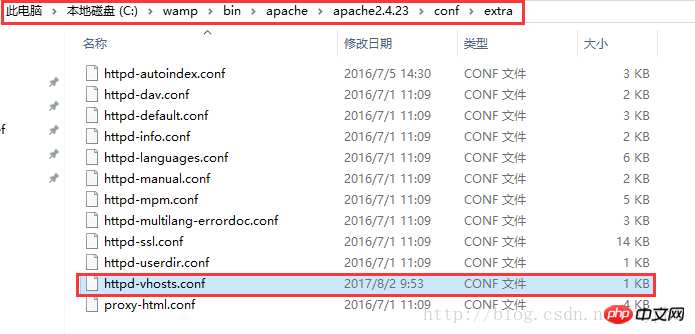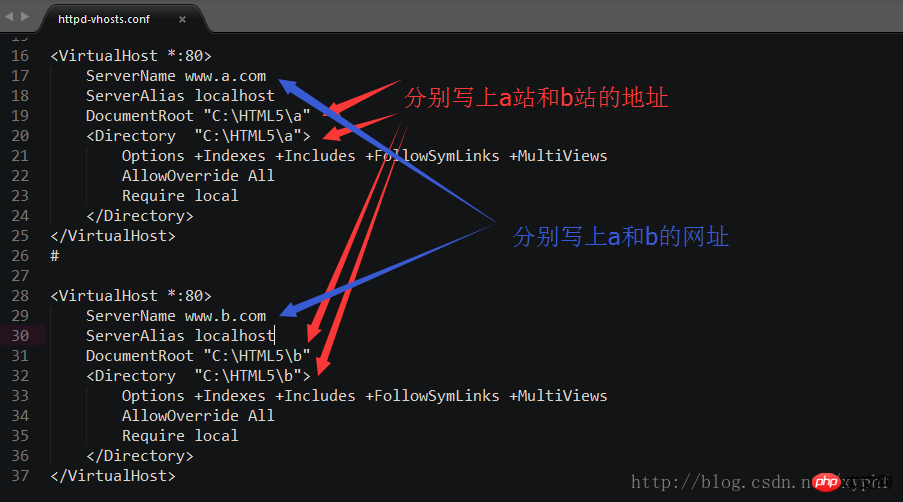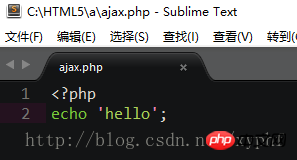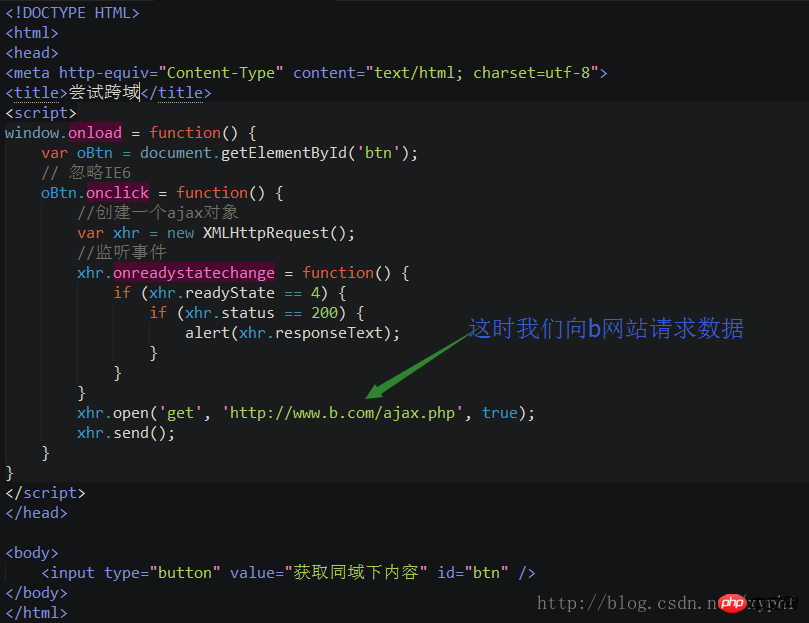 Backend Development
Backend Development
 PHP Tutorial
PHP Tutorial
 Detailed examples of the principles of Ajax cross-domain requests
Detailed examples of the principles of Ajax cross-domain requests
Detailed examples of the principles of Ajax cross-domain requests
This article mainly introduces the principle of Ajax cross-domain requests in detail. How does Ajax make cross-domain requests? It has certain reference value. Interested friends can refer to it. I hope it can help everyone better master Ajax cross-domain requests.
Let’s build two local sites to demonstrate
The first step is to build an Apache server locally; download address;
The second step is after the server is configured, in Configure two virtual domain names locally;
The third step is to create a folder on the C drive and name it "HTML5";
The fourth step is to find the configuration file of the Apache virtual host, and then open the configuration file

The fifth step is to create a folder a and a folder b respectively under the HTML5 folder created in the third step;
The sixth step is to modify the Apache virtual host Configuration file, as shown in the figure

The seventh step is to modify the host file and add the URLs of a and b. Usually the host file path is C:\Windows\System32\ Under drivers\etc

We create a 7.ajax.html file under the HTML5/a folder
<!DOCTYPE HTML>
<html>
<head>
<meta http-equiv="Content-Type" content="text/html; charset=utf-8">
<title>获取同域下内容</title>
<script>
window.onload = function() {
var oBtn = document.getElementById('btn');
// 忽略IE6
oBtn.onclick = function() {
//创建一个ajax对象
var xhr = new XMLHttpRequest();
//监听事件
xhr.onreadystatechange = function() {
if (xhr.readyState == 4) {
if (xhr.status == 200) {
alert(xhr.responseText);
}
}
}
xhr.open('get', 'Detailed examples of the principles of Ajax cross-domain requests', true);
xhr.send();
}
}
</script>
</head>
<body>
<input type="button" value="获取同域下内容" id="btn" />
</body>
</html>We first Take a look at the requests under the same domain
We create a php file under HTML5/a and return 'hello';

At this time, we are opening the current page Detailed examples of the principles of Ajax cross-domain requests , and clicking the button we find that the data is requested;
http://www.a .com/7.ajax.html

But if it is cross-domain, that is, the data you requested and the current file are not under the same domain, then it will Cross-domain requests are generated, and usually in this case you will be prohibited from accessing
For example, we will now put the Detailed examples of the principles of Ajax cross-domain requests file just in the HTML5/a folder into the b folder

After clicking at this time, we found that the request reported an error, which means that cross-domain requests were restricted

At this time we The backend needs to cooperate. You need to tell the backend to add an "Access-Control-Allow-Origin" header when outputting
For example: As shown in the figure, it means that as long as the cross-domain request of this domain name is cross-domain Impact of the strategy

When I click this time, I can obtain cross-domain data normally

If you want to be compatible with IE, you need
<!DOCTYPE HTML>
<html>
<head>
<meta http-equiv="Content-Type" content="text/html; charset=utf-8">
<title>ajax跨域请求</title>
<script>
window.onload = function() {
/*
在标准浏览器下,XMLHttpRequest对象已经是升级版本,支持了更多的特性,可以跨域了
但是,如果想实现跨域请求,还需要后端的相关配合才可以
XMLHttpRequest : 增加很多功能,他也不推荐使用onreadystatechange这个事件来监听,推荐使用onload
*/
var oBtn = document.getElementById('btn');
oBtn.onclick = function() {
// 这是标准浏览器写法
var xhr = new XMLHttpRequest();
xhr.onreadystatechange = function() {
if (xhr.readyState == 4) {
if (xhr.status == 200) {
alert(xhr.responseText);
}
}
}
xhr.open('get', 'http://www.b.com/Detailed examples of the principles of Ajax cross-domain requests', true);
xhr.send();
/*
如果你想兼容IE浏览器,可以特地为IE做兼容,忽略IE6
XDomainRequest : IE如果想实现跨域请求,则需要使用这个对象去实现
var oXDomainRequest = new XDomainRequest();
oXDomainRequest.onload = function() {
alert(this.responseText);
}
oXDomainRequest.open('get', 'http://www.b.com/Detailed examples of the principles of Ajax cross-domain requests', true);
oXDomainRequest.send();
*/
}
}
</script>
</head>
<body>
<input type="button" value="获取同域下内容" id="btn" />
</body>
</html>Related recommendations:
Examples explaining the four methods of AJAX cross-domain request data
Detailed explanation of how to implement Javascript cross-domain request code
Detailed introduction of AJAX cross-domain request
The above is the detailed content of Detailed examples of the principles of Ajax cross-domain requests. For more information, please follow other related articles on the PHP Chinese website!

Hot AI Tools

Undresser.AI Undress
AI-powered app for creating realistic nude photos

AI Clothes Remover
Online AI tool for removing clothes from photos.

Undress AI Tool
Undress images for free

Clothoff.io
AI clothes remover

Video Face Swap
Swap faces in any video effortlessly with our completely free AI face swap tool!

Hot Article

Hot Tools

Notepad++7.3.1
Easy-to-use and free code editor

SublimeText3 Chinese version
Chinese version, very easy to use

Zend Studio 13.0.1
Powerful PHP integrated development environment

Dreamweaver CS6
Visual web development tools

SublimeText3 Mac version
God-level code editing software (SublimeText3)

Hot Topics
 Analysis of the function and principle of nohup
Mar 25, 2024 pm 03:24 PM
Analysis of the function and principle of nohup
Mar 25, 2024 pm 03:24 PM
Analysis of the role and principle of nohup In Unix and Unix-like operating systems, nohup is a commonly used command that is used to run commands in the background. Even if the user exits the current session or closes the terminal window, the command can still continue to be executed. In this article, we will analyze the function and principle of the nohup command in detail. 1. The role of nohup: Running commands in the background: Through the nohup command, we can let long-running commands continue to execute in the background without being affected by the user exiting the terminal session. This needs to be run
 PHP and Ajax: Building an autocomplete suggestion engine
Jun 02, 2024 pm 08:39 PM
PHP and Ajax: Building an autocomplete suggestion engine
Jun 02, 2024 pm 08:39 PM
Build an autocomplete suggestion engine using PHP and Ajax: Server-side script: handles Ajax requests and returns suggestions (autocomplete.php). Client script: Send Ajax request and display suggestions (autocomplete.js). Practical case: Include script in HTML page and specify search-input element identifier.
 How to solve the 403 error encountered by jQuery AJAX request
Feb 20, 2024 am 10:07 AM
How to solve the 403 error encountered by jQuery AJAX request
Feb 20, 2024 am 10:07 AM
Title: Methods and code examples to resolve 403 errors in jQuery AJAX requests. The 403 error refers to a request that the server prohibits access to a resource. This error usually occurs because the request lacks permissions or is rejected by the server. When making jQueryAJAX requests, you sometimes encounter this situation. This article will introduce how to solve this problem and provide code examples. Solution: Check permissions: First ensure that the requested URL address is correct and verify that you have sufficient permissions to access the resource.
 How to solve jQuery AJAX request 403 error
Feb 19, 2024 pm 05:55 PM
How to solve jQuery AJAX request 403 error
Feb 19, 2024 pm 05:55 PM
jQuery is a popular JavaScript library used to simplify client-side development. AJAX is a technology that sends asynchronous requests and interacts with the server without reloading the entire web page. However, when using jQuery to make AJAX requests, you sometimes encounter 403 errors. 403 errors are usually server-denied access errors, possibly due to security policy or permission issues. In this article, we will discuss how to resolve jQueryAJAX request encountering 403 error
 In-depth discussion of the principles and practices of the Struts framework
Feb 18, 2024 pm 06:10 PM
In-depth discussion of the principles and practices of the Struts framework
Feb 18, 2024 pm 06:10 PM
Principle analysis and practical exploration of the Struts framework. As a commonly used MVC framework in JavaWeb development, the Struts framework has good design patterns and scalability and is widely used in enterprise-level application development. This article will analyze the principles of the Struts framework and explore it with actual code examples to help readers better understand and apply the framework. 1. Analysis of the principles of the Struts framework 1. MVC architecture The Struts framework is based on MVC (Model-View-Con
 How to solve the problem of jQuery AJAX error 403?
Feb 23, 2024 pm 04:27 PM
How to solve the problem of jQuery AJAX error 403?
Feb 23, 2024 pm 04:27 PM
How to solve the problem of jQueryAJAX error 403? When developing web applications, jQuery is often used to send asynchronous requests. However, sometimes you may encounter error code 403 when using jQueryAJAX, indicating that access is forbidden by the server. This is usually caused by server-side security settings, but there are ways to work around it. This article will introduce how to solve the problem of jQueryAJAX error 403 and provide specific code examples. 1. to make
 In-depth understanding of the batch Insert implementation principle in MyBatis
Feb 21, 2024 pm 04:42 PM
In-depth understanding of the batch Insert implementation principle in MyBatis
Feb 21, 2024 pm 04:42 PM
MyBatis is a popular Java persistence layer framework that is widely used in various Java projects. Among them, batch insertion is a common operation that can effectively improve the performance of database operations. This article will deeply explore the implementation principle of batch Insert in MyBatis, and analyze it in detail with specific code examples. Batch Insert in MyBatis In MyBatis, batch Insert operations are usually implemented using dynamic SQL. By constructing a line S containing multiple inserted values
 How to get variables from PHP method using Ajax?
Mar 09, 2024 pm 05:36 PM
How to get variables from PHP method using Ajax?
Mar 09, 2024 pm 05:36 PM
Using Ajax to obtain variables from PHP methods is a common scenario in web development. Through Ajax, the page can be dynamically obtained without refreshing the data. In this article, we will introduce how to use Ajax to get variables from PHP methods, and provide specific code examples. First, we need to write a PHP file to handle the Ajax request and return the required variables. Here is sample code for a simple PHP file getData.php:





